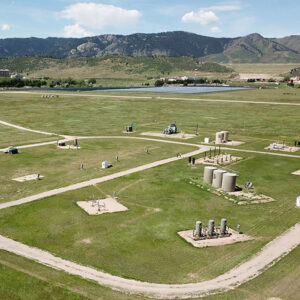Tracking climate change sources
CSU home to methane leak detection and research facility
story by Josh Rhoten
published April 11, 2024
Natural gas is widely seen as a bridge fuel to low-carbon energy. Compared to coal, natural gas releases less carbon dioxide into the atmosphere. A national shift based on that dynamic has led to a reduction in carbon dioxide emissions from U.S. power plants of about 35% since 2005, according to the Congressional Budget Office. However, natural gas is primarily made of methane, which can escape from production and transport systems. Because methane is itself a powerful greenhouse gas contributor, even small leaks can reduce its benefits as an alternative fuel source to address climate change.
The Methane Emissions Technology Evaluation Center is a unique testing facility at Colorado State University designed to help industry leaders and academics address that issue. Constructed in 2017, the center mimics the real-world conditions for onshore oil and gas production facilities. This setup provides a safe and completely controllable environment to test systems across a wide range of conditions. The center will also receive substantial new funding from the Department of Energy this year to refresh its facilities and extend testing operations to multiple regions and facility types. Learn how METEC operates and is helping bring stakeholders together around this critical challenge in this video.





